Return to CALL resources main page | View Site Index | Vance's: introduction
This url: http://www.homestead.com/prosites-vstevens/files/efi/papers/horizonlive/2005mar15vance.htm
![]()
Return to CALL
resources main page | View Site Index |
Vance's: introduction
This url:
http://www.homestead.com/prosites-vstevens/files/efi/papers/horizonlive/2005mar15vance.htm
|
|
|
This presentation was originally scheduled for Tuesday, February 22, 2005, but was rescheduled.as indicated above. The presentation is free but pre-registration is required. The recording of the presentation is here: http://lecture.horizonwimba.com/launcher.cgi?channel=stevens_2005_0315_1202_45
What this presentation is about:
This presentation is about building a sense of community in an online learning environment where learning takes place among interested parties, often using chat, voice, and video presentation clients such as this one that we're using here at Horizon Live. There have been many presentations here at Horizon Live about such communities and learning environments, and these presentations rarely fail to impress. Webheads, the community I'm involved in, is impressive too, but it is also distinct from many of the entities that normally present here. I'd like to examine in some detail this distinction, because I think that in the perspective of other online communities and learning environments the unique aspects of Webheads are what I'd like to get into today.
Who/What is/are Webheads?
Before we start, I'd like to ask a couple of questions:
First of all, how many of you have heard of Webheads before?
Secondly, how many of you in this group ARE Webheads?
For the benefit of all the others, let me explain what Webheads is (or are?). Perhaps one of the webheads present here would like to explain??
Webheads is a community of practice. What's that? A community of practice is a group of people who meet spontaneously and regularly for the purpose of furthering and learning more about their common goals and desired expertise (or their 'practice').
"Webheads" is an umbrella term for an online community of language learners and teachers that has developed in two distinct directions since we started meeting each week online in 1998. Here's one of the directions:
|
w4w_gallery.jpg |
http://sites.hsprofessional.com/vstevens/files/efi/webheads.htm |
This is the first group, which was and still is a community of language learners called Writing for Webheads. This slide shows a few of their pictures. The second group, which came together in late 2001 is a community of language teaching practitioners, and we call this one Webheads in Action. Here are their pictures which I've put up at the WiA portal page:
|
wia_gallery.jpg |
http://www.vancestevens.com/papers/evonline2002/webheads.htm |
The latter group has gone forth and multiplied to spawn a couple of Becoming Webheads groups as well as numerous other study and project teams.
Professional development: the EVOnline connection
These groups tend to get their impetus during the annual TESOL Electronic Village Online sessions. The EVOnline sessions are free workshops given each year by a group of mostly TESOL members who are also mostly webheads. The program is now in its 4th year I believe. There is more information here:
http://www.geocities.com/ehansonsmi/evo2005/announce.html
These are sessions given entirely online by volunteers who teach various IT and other theoretical applied linguistics skills, for free, to other teachers who sign up for free, with no strings attached, meaning TESOL membership is not necessary. There have been sessions the last couple of years on Becoming a Webhead, and they've been very popular and exceedingly well conducted by dynamic moderators who generally credit me with having something to do with their enthusiasm and comfort level with technology. There are 300 members in the Writing for Webheads group and another 300 in the Webheads in Action group. The latest Becoming Webheads group to form in the most recent EVOnline sessions has over 200 members, so although there is some overlap in these groups, there are at least 500 and probably as many as 800 registered Webheads; that is people registered in Webheads groups somewhere in the world today, and the number grows steadily year by year.
Here are some of the groups that have formed and their web pages:
|
baw2005_gallery.jpg |
BaW2005: http://80.60.224.77/dyg/baw-05/ Egypt Webheads: http://groups.yahoo.com/group/egyptwebheads/ Tunisian Webheads: http://groups.yahoo.com/group/mahdia_2004/ |
The sessions cover a wide range of activities but when Webheads give them they tend to focus on CMC or computer mediated communications issues, such as how to get yourself online, how to create blogs, and so on. I like this portal for Bee's session, which utilizes a graphic from a blogger who calls herself Blaugstein. Bee is Barbara Dieu, one of our most energetic Webhead contributors from Brazil. Here's her portal for this season's session on blogging:
|
netmay |
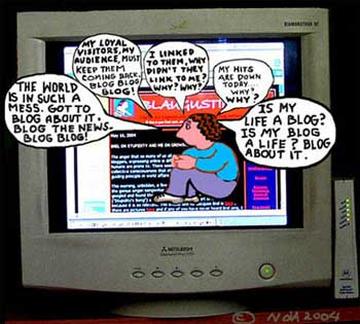
Professional development: the TESOL connection
One of our original Webheads sessions, our second one in 2003, focused on Webheads as a community of practice, and some of the people who put on that session took the results to TESOL and gave a colloquium where the presenters who couldn't get there interacted live via our chat and web cam tools with the live audience in Baltimore. The session was significant in that is was one of the few times that an online component to a presentation has been attempted at TESOL. The year before, we had webcast OUT from an academic session there over Yahoo Messenger to an online audience, but this was certainly one of the first times that presenters were brought INTO the conference from remote locations and perhaps the first (last?) time this was attempted over a phone line, again using, as I recall, Yahoo Messenger for the video and voice hookups.
|
Here's a pic showing interaction in Yahoo voice and video chat: 040401evonline13.jpg |
The PCI event is described here: http://www.geocities.com/vance_stevens/papers/tesol/baltimore2003/copractice.html#colloquium |
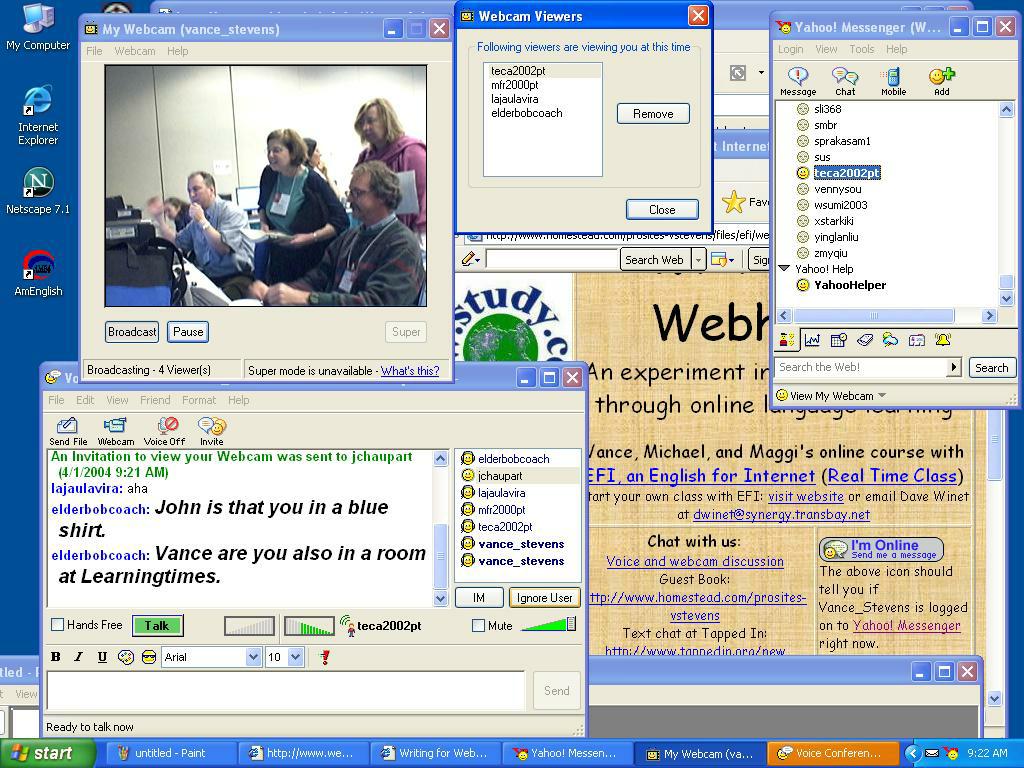
The following year we put on a more elaborate pre-convention institute lasting all day in which we got those signed up for it into a participant community well before the event. We interacted with this community using our normal tools, prepped them for the event, and when we finally got together at in Long Beach we came together as old friends. The ice was broken and the session could not but succeed, which it did. We also again had presenters joining us remotely; particularly Dafne Gonzalez from Venezuela who was living in Spain at the time. As we usually do we brought her in live to speak to our participants over free online voice communications tools, and to present her slide show from a distance.
|
tesol2004_webheads_pci.jpg |
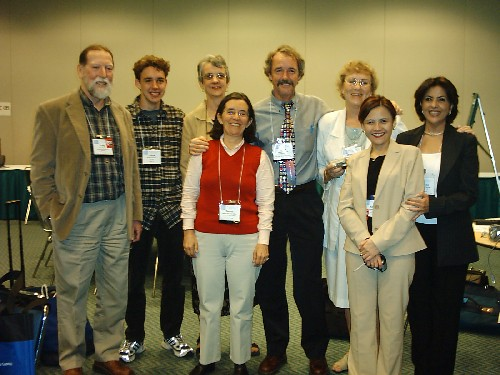
You can see from the smiling faces the pleasure in being part of a productive community who in most cases had just met for the first time, after in some instances, years of online interaction.
Chris Jones, another of the PCI presenters, also put pictures of the event up on her web page:
http://www.geocities.com/edtec2002/tesol-2004/pci-photos.htm
There should be links from these pages back to the portal for the event, here:
http://www.geocities.com/vance_stevens/papers/evonline2002/pci2004.htm
Some of the tools we use
Instant Messengers
Now this says something about the CMC tools that we use. Yahoo Messenger over a dialup connection? Why not, it's free, and it works. In fact, in case you are interested Yahoo Messenger is the best all round instant messenger service that you can use if you don't want to pay for it AND if you want to web cam and voice chat many to many, in conference mode. It's the only IM (instant messenger) that I am aware of that scores on BOTH those counts. Many such as MSN Messenger will only web cam one to one, and Pal Talk for example limits you to a certain number of interactants. Yahoo Messenger is a versatile tool that is commonly installed on computers all over the world, lets you find buddies online, and is often our fallback multimedia chat choice in case our more elaborate tools aren't working. A number of the tools we use for CMC are detailed here:
http://www.homestead.com/prosites-vstevens/files/efi/software.htm
Webheads has gained recognition now to the point where our efforts are facilitated and supported by a number of educational entities operating online, which have made available to us their facilities without charge, so that Webheads has never had any need for a budget, except for web hosting, and where we had to rent a phone line all week at a convention center once. Three of these entities come to mind at this point.
Tapped In
One is Tapped In: http://www.tappedin.org - this is an exceptional community, free to educators, funded by a number of non-intrusive and apparently altruistic corporations, which provides an excellent text and GUI interface where educators can meet and exchange views, knowledge and expertise. Webheads have met there every Sunday noon GMT for the past several years, don't remember offhand exactly for how long, but at least since the turn of the century. All are welcome in this community.
We often use Tapped In as a convenient launch pad to other portals, depending on what kind of interaction we are in the mood for. We are fortunate to have been granted a couple of web spaces similar to Horizon Live which would normally cost money but which are provided to us for free.
Alado (Talking Communities)
|
alado.jpg |
One of these is Alado, which we access through http://www.alado.net/webheads/ Our mentor here is Andy Pincon, who seemingly devotes himself to a number of good causes involving disadvantaged youngsters in the Chicago area. He brings educators together in support of his activities through Alado's voice and presentation portals, which he also has put at the disposal of Webheads. |
.
We met Andy through participation in one of the annual Global Learn Days. This annual event is the brainchild of John Hibbs, who has managed for 8 years now to sail his metaphorical ships around the world starting at the dateline and progressing for 24 hours to various stops along the way to cater to presentations http://bfranklin.edu/gld/. Eight years ago, John was patching participants together in a network of phone calls gathering voices he streamed out to conference participants. He eventually moved through Encoder and Real Player to Alado, and by then Webheads had become regulars on the world tour. The event happens once a year, usually in November, and for a day provides a virtually accessible marathon spectacle of content, connectivity, and coordination. Many online associations have developed as a result of this event, the Alado connection for webheads being just one of these.
Learning Times
|
040402classic12.jpg |
Yet another group of strong supporters are the friendly folks at Learning Times, http://www.learningtimes.net. This is a community of educators, providing community support often for free, sometimes for a fee, but for Webheads, as befits the services we provide others, there is no charge. Learning Times have provided us a voice and web cam enabled chat room at http://www.tinyurl.com/y3eh . There is a whiteboard there and a number of interactive facilities similar to those at Horizon Live. |
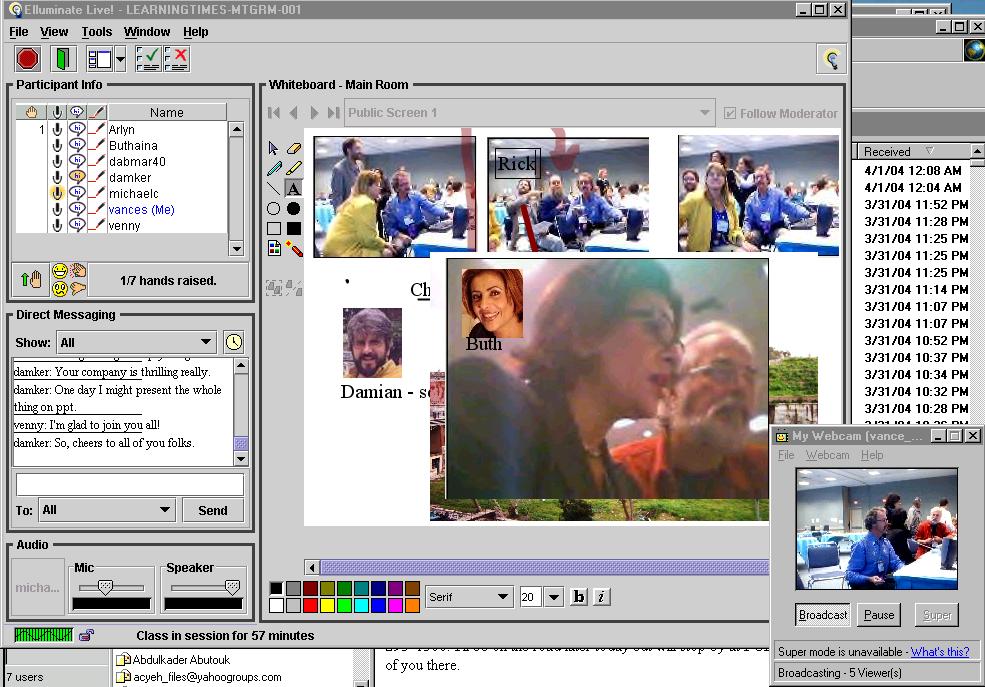
We have often held conferences and other less formal events there. A recent conference event was Belnate, based in Minsk in Belarussia, where the resident webhead there, Sergei Grid, organized his colleages in a series of sessions and workshops given, for free as usual, by a characteristically accommodating group of Webheads. http://www.ir.bsu.by/kel/Teachers/presentations.htm
Are we still on topic?
There are more examples of this kind of interaction than I can hope to enumerate here. Webheads have done their bit to maintain community cohesion by contributing to the archives. I started to list some of our contributing members here but decided that I was opening a can of worms, there are so many of us who keep web pages. However I'd like to mention Teresa Almeida d'Eca in Lisbon who records not only our academic events but also our interpersonal successes in meeting up with one another F2F as we call it, in various parts of the world, usually involving food and beverage in a good local restaurant. Her record of Webheads over the years is worth exploring:
http://www.malhatlantica.pt/teresadeca/webheads/wia-index.htm
Now what was this talk about, and have I gone off the topic? Absolutely not. This talk is an inductively constructed inventory of characteristics of a community that formed online, has retained its online character despite the occasional face to face meeting of its members, and that has stood the test of time for around 7 years now. Now I'd like to take a short break from talking and ask you to respond to some questions.
How do we sustain our cohesion?
Of two of the ingredients important to community formation in our community, which do you think has been the most beneficial to group cohesion?
Voices? Or faces?
Now, I think open-ended questions are possible here. If so let's see if I can get you to write in ...
What from the foregoing do you think are the most cohesive ingredients to community formation in an online environment like Webheads?
So what is it Webheads do exactly? This is a question we are constantly asked and we are as constantly at a loss to answer it. Logistically, we meet regularly, every Sunday noon GMT at http://www.tappedin.org. People who turn up there often ask us if there is a topic for the meeting. There rarely is one. Meetings with topics are generally successful in the short term, but in an analogy I often invoke, set-piece topical sessions are to webheads free-wheeling chat as conference presentations and formal meetings to get-togethers in a pub or name-your-social-group. Which one are you most likely to go to most often and over the long term. Out of a sense of habit and from an urge to socialize, you're more likely to be found at your social gathering place regularly and over the long term. You'll attend seminars and meetings through a mixture of interest and obligation, but you might find it difficult to cope with the strain of attending such meetings, let alone organizing them, over the very long term. Webheads have been meeting socially since 1998, regularly each Sunday, for over seven years.
Why? Proponents of participation in such communities feel that they encourage scaffolding among members of the type suggested in the socioculture theory of Vygotsky, which underpins constructivist approaches to learning. Bonk and Cunningham, 1998, in one of my favorite works, develop a cogent rational favoring the efficacy of technology-enhanced collaborative learning from learner-centered, constructivist, and sociocultural perspectives. From these perspectives, it is felt that learning is best effected when learners are able to construct knowledge from elements that they have internalized in a meaningful fashion, and in a highly social environment where learners interact and learn from others in their immediate surroundings, or zone of proximal development. More recently there has been increased interest among educators using CMC in how these principles mediate the formation and functioning of communities of practice, a construct articulated particularly well by Etienne Wenger (e.g. Wenger, 1998). Essentially, communities of practice are groups of people who meet to discuss a topic (technically, a 'domain') of so much interest to community members that they will be intrinsically motivated to enhance their understanding of the topic through frequent interaction in order to further their work or interest in the field to which the topic pertains. Thus it comes as no surprise that CMC tools should promote the development of communities of practice over distances.
To achieve their aims, the two flourishing Webheads groups have explored and successfully exploited the potential of a great variety of free Internet text, voice, and video CMC tools. Members' skills in utilizing these web-based tools have been developed through constructivist methods; i.e. scaffolding one another by means of interaction within each other's zone of proximal development. We feel that the Webheads projects model the benefits to elearning of adopting a pedagogical stance that is much more flexible and interactive than teacher directed models, which are being widely supplanted in any event in both physical and virtual classroom environments. Given that there is a trend toward learner centered, constructivist approaches to learning, it is convenient and more than coincidental that the greater empowerment personal computing has brought us all should be a strong factor in this development, especially the ability of computers to facilitate exploration and communication in any target language.
|
02learners.gif |
I've got a bibliography and a more cogent characterization of our
rationale here: http://cwp60.berkeley.edu:16080/TESL-EJ/ej28/int.html |
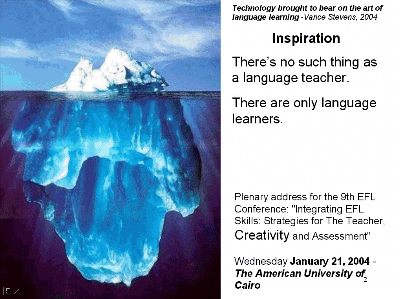
Most importantly: The student connection
What about students? At the last TESOL conference I gave a talk on having FUN in online environments. FUN is an acronym for frivolous unanticipated nonsense.
http://www.homestead.com/prosites-vstevens/files/efi/papers/tesol/colloquium2004/fun00.htm
That's often what happens when teachers put their students into what one of our colleagues, Shinichi Ito, used to call going from the fishbowl to the ocean, where they got popped into the deep end as it were, and were left to communicate for real with actual online interactants.
Lots of Webheads have engineered such encounters. One who has documented what it's like particularly well is Aiden Yeh. She has a couple of videos on her sites that show us what students do when they interact online, and one that I think provides real insights into the potential. Let's see if we can get these to play:
http://dcyeh.com/sy0304/2ndsem/groupb_projects/stories/online/
http://dcyeh.com/sy0304/2ndsem/groupa_projects/tpr/students_pres/
What is unique about Webheads?
Now, I think we're in a position to address what is interesting about webheads, what makes it unique. All learning communities are in some ways unique but many have in common that they are driven through some institutional mechanism ...
Webheads is unique in that it is not ...
What do you think distinguishes webheads from other online educational efforts you've seen presented here lately?
(after discussion) ... did we talk about
and so on ...
(Vance checks his watch) how we doin' here?
Some references
Bonk, C. and Cunningham, D. (1998). Searching for learner-centered, constructivist, and sociocultural components of collaborative educational learning tools. In C. Bonk & K. King (Eds.), Electronic Collaborators: Learner-centered technologies for literacy, apprenticeship, and discourse (pp. 25-50). Mahwah, NJ: Lawrence Erlbaum Associates. Retrieved February 15, 2004, from: http://www.publicationshare.com/docs/Bon02.pdf
Stevens, Vance. (2004b). The Skill of Communication: Technology brought to bear on the art of language learning. In TESL-EJ 7, 4 (On the Internet). Retrieved March 15, 2005 from: http://cwp60.berkeley.edu:16080/TESL-EJ/ej28/int.html.
Wenger, E. (1998) Communities of practice Learning as a social system. Retrieved February 15, 2004, from: http://www.co-i-l.com/coil/knowledge-garden/cop/lss.shtml
|
For comments, suggestions, or further information
on this page Last Updated: March 17, 2005 |
Copyright 2005 by Vance Stevens